A Bibliometric Analysis of the Role of Digitalization in Achieving Sustainability-Oriented Innovation
Abstract
1. Introduction
2. Background and Concept Definition
2.1. Digitization, Digitalization, and Digital Transformation
2.2. Sustainability
2.3. Sustainability-Oriented Innovation
2.4. The Relationship Between Digitalization, Innovation, and Sustainability
3. Materials and Methods
- Regarding the document type, editorials, retracted publications and book chapters, including only research articles, proceeding papers, review articles, and early access papers, were excluded (N = 926).
- All documents not published in English were excluded (N = 926)
- Only papers from the following Web of Science categories were included: Environmental Sciences, Green Sustainable Science Technology, Environmental Studies, Management, Business, Economics, Social Sciences Interdisciplinary, Multidisciplinary Sciences, Computer Science Interdisciplinary Applications, Operation Research Management Science, Hospitality Leisure Sports Tourism, Business Finance, Public Environment Occupational Health, Internal, Information Science Library Science, Communication (N = 775).
4. Results and Discussion
4.1. Descriptive Statistics
4.2. The Conceptual, Intellectual, and Social Structure of the Scientific Literature Regarding the Relationship Between Organizational Digitalization, Innovation, and Sustainability
5. Conclusions
Author Contributions
Funding
Institutional Review Board Statement
Informed Consent Statement
Data Availability Statement
Acknowledgments
Conflicts of Interest
References
- Verhoef, P.C.; Broekhuizen, T.; Bart, Y.; Bhattacharya, A.; Qi Dong, J.; Fabian, N.; Haenlein, M. Digital Transformation: A Multidisciplinary Reflection and Research Agenda. J. Bus. Res. 2021, 122, 889–901. [Google Scholar] [CrossRef]
- Yoo, Y. Computing in Everyday Life: A Call for Research on Experiential Computing. MIS Q. 2010, 34, 213–231. [Google Scholar] [CrossRef]
- Denner, M.-S.; Püschel, L.C.; Röglinger, M. How to Exploit the Digitalization Potential of Business Processes. Bus. Inf. Syst. Eng. 2018, 60, 331–349. [Google Scholar] [CrossRef]
- Ackx, S. Emerging Technologies, Disrupt or Be Disrupted. In Proceedings of the ISSE 2014 Securing Electronic Business Processes, Dresden, Germany, 7–11 May 2014; Reimer, H., Pohlmann, N., Schneider, W., Eds.; Springer Fachmedien: Wiesbaden, Germany, 2014; pp. 177–187. [Google Scholar]
- Uhl, A.; Born, M.; Koschmider, A.; Janasz, T. Digital Capability Framework: A Toolset to Become a Digital Enterprise. In Digital Enterprise Transformation; Routledge: London, UK, 2016; pp. 27–60. ISBN 978-1-315-57716-6. [Google Scholar]
- Bican, P.M.; Brem, A. Digital Business Model, Digital Transformation, Digital Entrepreneurship: Is There A Sustainable “Digital”? Sustainability 2020, 12, 5239. [Google Scholar] [CrossRef]
- Fors, A.C. The Ontology of the Subject in Digitalization. In Handbook of Research on Technoself: Identity in a Technological Society; IGI Global Scientific Publishing: Hershey, PA, USA, 2013; pp. 45–63. ISBN 978-1-4666-2211-1. [Google Scholar]
- Yoo, Y.; Henfridsson, O.; Lyytinen, K. Research Commentary: The New Organizing Logic of Digital Innovation: An Agenda for Information Systems Research. Inf. Syst. Res. 2010, 21, 724–735. [Google Scholar] [CrossRef]
- Sussan, F.; Acs, Z.J. The Digital Entrepreneurial Ecosystem. Small Bus. Econ. 2017, 49, 55–73. [Google Scholar] [CrossRef]
- Tilson, D.; Lyytinen, K.; Sørensen, C. Research Commentary—Digital Infrastructures: The Missing IS Research Agenda. Inf. Syst. Res. 2010, 21, 748–759. [Google Scholar] [CrossRef]
- Li, F.; Nucciarelli, A.; Roden, S.; Graham, G. How Smart Cities Transform Operations Models: A New Research Agenda for Operations Management in the Digital Economy. Prod. Plan. Control 2016, 27, 514–528. [Google Scholar] [CrossRef]
- Ajigini, O.A.; Chinamasa, T.J.W. Modelling Digital Transformation Within the Financial Sector: A South African Perspective. Inf. Resour. Manag. J. 2023, 36, 1–20. [Google Scholar] [CrossRef]
- Kusters, A.C. Relating Digitization, Digitalization and Digital Transformation: A Maturity Model and Roadmap for Dutch Logistics Companies. Available online: https://essay.utwente.nl/89432/ (accessed on 4 March 2025).
- Abou-foul, M.; Ruiz-Alba, J.L.; Soares, A. The Impact of Digitalization and Servitization on the Financial Performance: An Empirical Analysis. Prod. Plan. Control 2020, 32, 975–989. [Google Scholar] [CrossRef]
- Adrodegari, F.; Saccani, N. Business Models for the Service Transformation of Industrial Firms. Serv. Ind. J. 2017, 37, 57–83. [Google Scholar] [CrossRef]
- Baird, A.; Raghu, T.S. Associating Consumer Perceived Value with Business Models for Digital Services. Eur. J. Inf. Syst. 2015, 24, 4–22. [Google Scholar] [CrossRef]
- Kowalkowski, C.; Kindström, D. Service Innovation in Product-Centric Firms: A Multidimensional Business Model Perspective. J. Bus. Ind. Mark. 2014, 29, 96–111. [Google Scholar] [CrossRef]
- Lenka, S.; Parida, V.; Wincent, J. Digitalization Capabilities as Enablers of Value Co-Creation in Servitizing Firms: DIGITALIZATION CAPABILITIES. Psychol. Mark. 2017, 34, 92–100. [Google Scholar] [CrossRef]
- Westerman, G.; Bonnet, D.; McAfee, A. Leading Digital: Turning Technology into Business Transformation; Harvard Business Press: Boston, MA, USA, 2014. [Google Scholar]
- Cardona, M.; Kretschmer, T.; Strobel, T. ICT and Productivity: Conclusions from the Empirical Literature. Inf. Econ. Policy 2013, 25, 109–125. [Google Scholar] [CrossRef]
- Guerra, J.; Danvila del Valle, I.; Méndez-Suárez, M. The Impact of Digital Transformation on Talent Management. Technol. Forecast. Soc. Change 2023, 188, 122291. [Google Scholar] [CrossRef]
- Metselaar, S.; Geurts, J.; Meynen, G. Responding to Human Brain Surrogates Research: The Value of Empirical Ethics. Am. J. Bioeth. 2021, 21, 64–66. [Google Scholar] [CrossRef]
- Ghobakhloo, M. Industry 4.0, Digitization, and Opportunities for Sustainability. J. Clean. Prod. 2020, 252, 119869. [Google Scholar] [CrossRef]
- Beier, G.; Niehoff, S.; Ziems, T.; Xue, B. Sustainability Aspects of a Digitalized Industry—A Comparative Study from China and Germany. Int. J. Precis. Eng. Manuf.-Green Technol. 2017, 4, 227–234. [Google Scholar] [CrossRef]
- Choi, S.; Ng, A. Environmental and Economic Dimensions of Sustainability and Price Effects on Consumer Responses. J. Bus. Ethics 2011, 104, 269–282. [Google Scholar] [CrossRef]
- Ford, S.; Despeisse, M. Additive Manufacturing and Sustainability: An Exploratory Study of the Advantages and Challenges. J. Clean. Prod. 2016, 137, 1573–1587. [Google Scholar] [CrossRef]
- Caradonna, J.L. Sustainability: A History; Oxford University Press: Oxford, UK, 2014; ISBN 978-0-19-937240-9. [Google Scholar]
- Kamble, S.S.; Gunasekaran, A.; Gawankar, S.A. Sustainable Industry 4.0 Framework: A Systematic Literature Review Identifying the Current Trends and Future Perspectives. Process Saf. Environ. Prot. 2018, 117, 408–425. [Google Scholar] [CrossRef]
- Khuntia, J.; Saldanha, T.; Mithas, S.; Sambamurthy, V. Information Technology and Sustainability: Evidence from an Emerging Economy. Prod. Oper. Manag. 2018, 26, 756–773. [Google Scholar] [CrossRef]
- Glavič, P.; Lukman, R. Review of Sustainability Terms and Their Definitions. J. Clean. Prod. 2007, 15, 1875–1885. [Google Scholar] [CrossRef]
- Dempsey, N.; Bramley, G.; Power, S.; Brown, C. The Social Dimension of Sustainable Development: Defining Urban Social Sustainability. Sustain. Dev. 2011, 19, 289–300. [Google Scholar] [CrossRef]
- Luisi, P.L. The Emergence of Life: From Chemical Origins to Synthetic Biology; Cambridge University Press: Cambridge, UK, 2016; ISBN 978-1-107-09239-6. [Google Scholar]
- Pasqualino, R.; Demartini, M.; Bagheri, F. Digital Transformation and Sustainable Oriented Innovation: A System Transition Model for Socio-Economic Scenario Analysis. Sustainability 2021, 13, 11564. [Google Scholar] [CrossRef]
- Maletič, M.; Maletič, D.; Dahlgaard, J.J.; Dahlgaard-Park, S.M.; Gomišček, B. Effect of Sustainability-Oriented Innovation Practices on the Overall Organisational Performance: An Empirical Examination. Total Qual. Manag. Bus. Excell. 2016, 27, 1171–1190. [Google Scholar] [CrossRef]
- Geradts, T.H.J.; Bocken, N.M.P. Driving Sustainability-Oriented Innovation. MIT Sloan Manag. Rev. 2018. Available online: https://sloanreview.mit.edu/article/driving-sustainability-oriented-innovation/ (accessed on 12 April 2025).
- Adams, R.; Jeanrenaud, S.; Bessant, J.; Denyer, D.; Overy, P. Sustainability-Oriented Innovation: A Systematic Review. Int. J. Manag. Rev. 2016, 18, 180–205. [Google Scholar] [CrossRef]
- Voegtlin, C.; Scherer, A.G. Responsible Innovation and the Innovation of Responsibility: Governing Sustainable Development in a Globalized World. J. Bus. Ethics 2017, 143, 227–243. [Google Scholar] [CrossRef]
- Goodman, J.; Korsunova, A.; Halme, M. Our Collaborative Future: Activities and Roles of Stakeholders in Sustainability-Oriented Innovation. Bus. Strategy Environ. 2017, 26, 731–753. [Google Scholar] [CrossRef]
- Brabete, V.; Sichigea, M.; Cîrciumaru, D.; Goagără, D. Bibliometric Mapping of the Relationships Between Accounting, Professional Accountants, and Sustainability Issues. Sustainability 2024, 16, 9508. [Google Scholar] [CrossRef]
- Donthu, N.; Kumar, S.; Mukherjee, D.; Pandey, N.; Lim, W.M. How to Conduct a Bibliometric Analysis: An Overview and Guidelines. J. Bus. Res. 2021, 133, 285–296. [Google Scholar] [CrossRef]
- van Oorschot, J.A.W.H.; Hofman, E.; Halman, J.I.M. A Bibliometric Review of the Innovation Adoption Literature. Technol. Forecast. Soc. Change 2018, 134, 1–21. [Google Scholar] [CrossRef]
- Vogel, R.; Güttel, W.H. The Dynamic Capability View in Strategic Management: A Bibliometric Review. Int. J. Manag. Rev. 2013, 15, 426–446. [Google Scholar] [CrossRef]
- Sherwin, C. Critical Friendships—‘Non-Government Organizations’ (NGOs) as a Stimulus for Sustainable Innovation and Change. Des. Manuf. Sustain. Dev. 2004, 2004, 23–31. [Google Scholar]
- Gatautis, R.; Gudauskas, R. E-Business Development in Lithuania: Problems and Perspectives. In Proceedings of the Fifth Wuhan International Conference on E-Business, Vilnius, Lithuania, 27–28 May 2006; Alfred University Press: Alfred, NY, USA, 2006; Volumes 1–3, pp. 176–183. [Google Scholar]
- Zhang, J.; Yu, Q.; Zheng, F.; Long, C.; Lu, Z.; Duan, Z. Comparing Keywords plus of WOS and Author Keywords: A Case Study of Patient Adherence Research. J. Assoc. Inf. Sci. Technol. 2016, 67, 967–972. [Google Scholar] [CrossRef]
- Kohtamäki, M.; Parida, V.; Oghazi, P.; Gebauer, H.; Baines, T. Digital Servitization Business Models in Ecosystems: A Theory of the Firm. J. Bus. Res. 2019, 104, 380–392. [Google Scholar] [CrossRef]
- Ghobakhloo, M.; Fathi, M. Corporate Survival in Industry 4.0 Era: The Enabling Role of Lean-Digitized Manufacturing. J. Manuf. Technol. Manag. 2020, 31, 1–30. [Google Scholar] [CrossRef]
- Chauhan, C.; Parida, V.; Dhir, A. Linking Circular Economy and Digitalisation Technologies: A Systematic Literature Review of Past Achievements and Future Promises. Technol. Forecast. Soc. Change 2022, 177, 121508. [Google Scholar] [CrossRef]
- Di Vaio, A.; Palladino, R.; Pezzi, A.; Kalisz, D.E. The Role of Digital Innovation in Knowledge Management Systems: A Systematic Literature Review. J. Bus. Res. 2021, 123, 220–231. [Google Scholar] [CrossRef]
- Denicolai, S.; Zucchella, A.; Magnani, G. Internationalization, Digitalization, and Sustainability: Are SMEs Ready? A Survey on Synergies and Substituting Effects among Growth Paths. Technol. Forecast. Soc. Change 2021, 166, 120650. [Google Scholar] [CrossRef]
- Isensee, C.; Teuteberg, F.; Griese, K.-M.; Topi, C. The Relationship between Organizational Culture, Sustainability, and Digitalization in SMEs: A Systematic Review. J. Clean. Prod. 2020, 275, 122944. [Google Scholar] [CrossRef]
- Belhadi, A.; Mani, V.; Kamble, S.S.; Khan, S.A.R.; Verma, S. Artificial intelligence-driven innovation for enhancing supply chain resilience and performance under the effect of supply chain dynamism: An empirical investigation. Ann. Oper. Res. 2024, 333, 627–652. [Google Scholar] [CrossRef]
- Ardito, L.; Raby, S.; Albino, V.; Bertoldi, B. The Duality of Digital and Environmental Orientations in the Context of SMEs: Implications for Innovation Performance. J. Bus. Res. 2021, 123, 44–56. [Google Scholar] [CrossRef]
- Li, W.; Li, M.; Wang, Y.; Chen, Z. Energy Management Strategy and Optimal Sizing for Hybrid Energy Storage Systems Using an Evolutionary Algorithm. IEEE Trans. Intell. Transp. Syst. 2022, 23, 14283–14293. [Google Scholar] [CrossRef]
- Guandalini, I. Sustainability through Digital Transformation: A Systematic Literature Review for Research Guidance. J. Bus. Res. 2022, 148, 456–471. [Google Scholar] [CrossRef]
- Ghobakhloo, M.; Iranmanesh, M.; Grybauskas, A.; Vilkas, M.; Petraitė, M. Industry 4.0, Innovation, and Sustainable Development: A Systematic Review and a Roadmap to Sustainable Innovation. Bus. Strategy Environ. 2021, 30, 4237–4257. [Google Scholar] [CrossRef]
- Paiola, M.; Schiavone, F.; Grandinetti, R.; Chen, J. Digital Servitization and Sustainability through Networking: Some Evidences from IoT-Based Business Models. J. Bus. Res. 2021, 132, 507–516. [Google Scholar] [CrossRef]
- Ukko, J.; Nasiri, M.; Saunila, M.; Rantala, T. Sustainability Strategy as a Moderator in the Relationship between Digital Business Strategy and Financial Performance. J. Clean. Prod. 2019, 236, 117626. [Google Scholar] [CrossRef]
- Forcadell, F.J.; Aracil, E.; Ubeda, F. Using Reputation for Corporate Sustainability to Tackle Banks Digitalization Challenges. Bus. Strategy Environ. 2020, 29, 2181–2193. [Google Scholar] [CrossRef]
- Belhadi, A.; Kamble, S.; Gunasekaran, A.; Mani, V. Analyzing the Mediating Role of Organizational Ambidexterity and Digital Business Transformation on Industry 4.0 Capabilities and Sustainable Supply Chain Performance. Supply Chain Manag. 2022, ahead-of-print. [Google Scholar] [CrossRef]
- Vial, G. Understanding Digital Transformation: A Review and a Research Agenda. J. Strateg. Inf. Syst. 2019, 28, 118–144. [Google Scholar] [CrossRef]
- Warner, K.S.R.; Wäger, M. Building Dynamic Capabilities for Digital Transformation: An Ongoing Process of Strategic Renewal. Long Range Plann. 2019, 52, 326–349. [Google Scholar] [CrossRef]
- Barney, J. Firm Resources and Sustained Competitive Advantage. J. Manag. 1991, 17, 99–120. [Google Scholar] [CrossRef]
- Teece, D.J. Explicating Dynamic Capabilities: The Nature and Microfoundations of (Sustainable) Enterprise Performance. Strateg. Manag. J. 2007, 28, 1319–1350. [Google Scholar] [CrossRef]
- Teece, D.J.; Pisano, G.; Shuen, A. Dynamic Capabilities and Strategic Management. Strateg. Manag. J. 1997, 18, 509–533. [Google Scholar] [CrossRef]
- Nambisan, S.; Wright, M.; Feldman, M. The Digital Transformation of Innovation and Entrepreneurship: Progress, Challenges and Key Themes. Res. Policy 2019, 48, 103773. [Google Scholar] [CrossRef]
- Bharadwaj, A.; El Sawy, O.A.; Pavlou, P.A.; Venkatraman, N.V. Digital Business Strategy: Toward a Next Generation of Insights. MIS Q. 2013, 37, 471–482. [Google Scholar] [CrossRef]
- Fornell, C.; Larcker, D.F. Evaluating structural equation models with unobservable variables and measurement error. J. Mark. Res. 1981, 18, 39–50. [Google Scholar] [CrossRef]
- Podsakoff, P.M.; MacKenzie, S.B.; Lee, J. -Y.; Podsakoff, N.P. Common method biases in behavioral research: A critical review of the literature and recommended remedies. J. Appl. Psychol. 2003, 88, 879–903. [Google Scholar] [CrossRef] [PubMed]
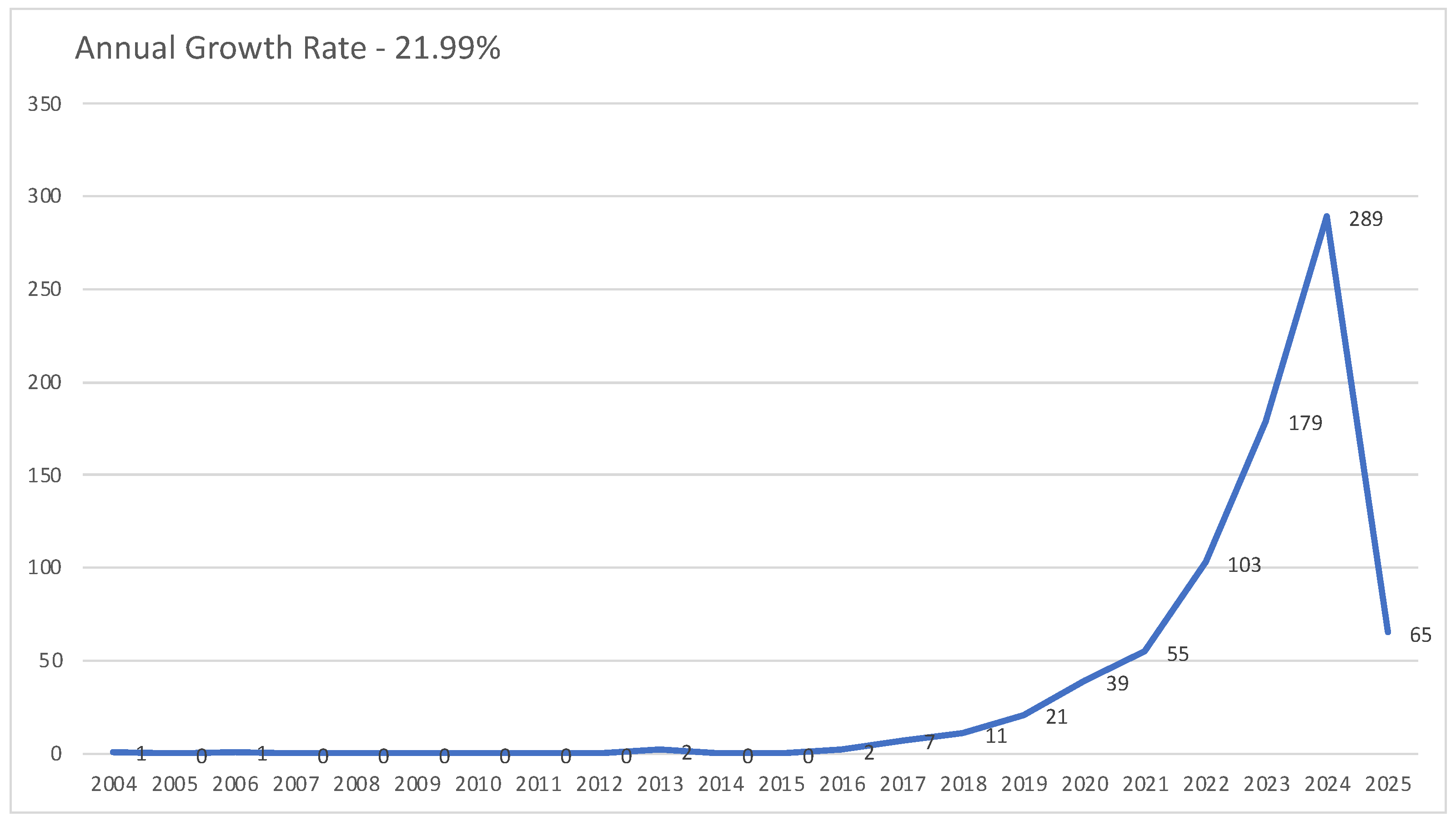
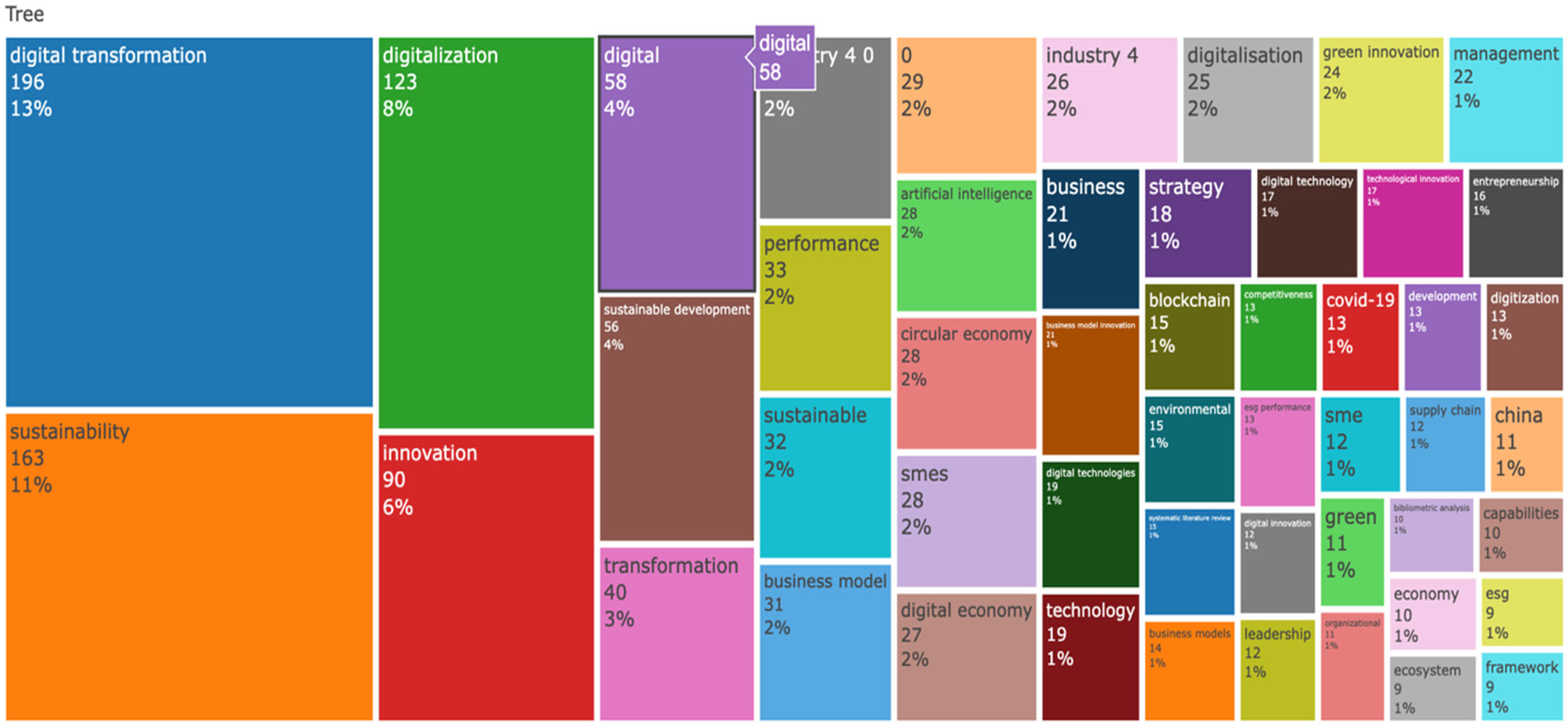
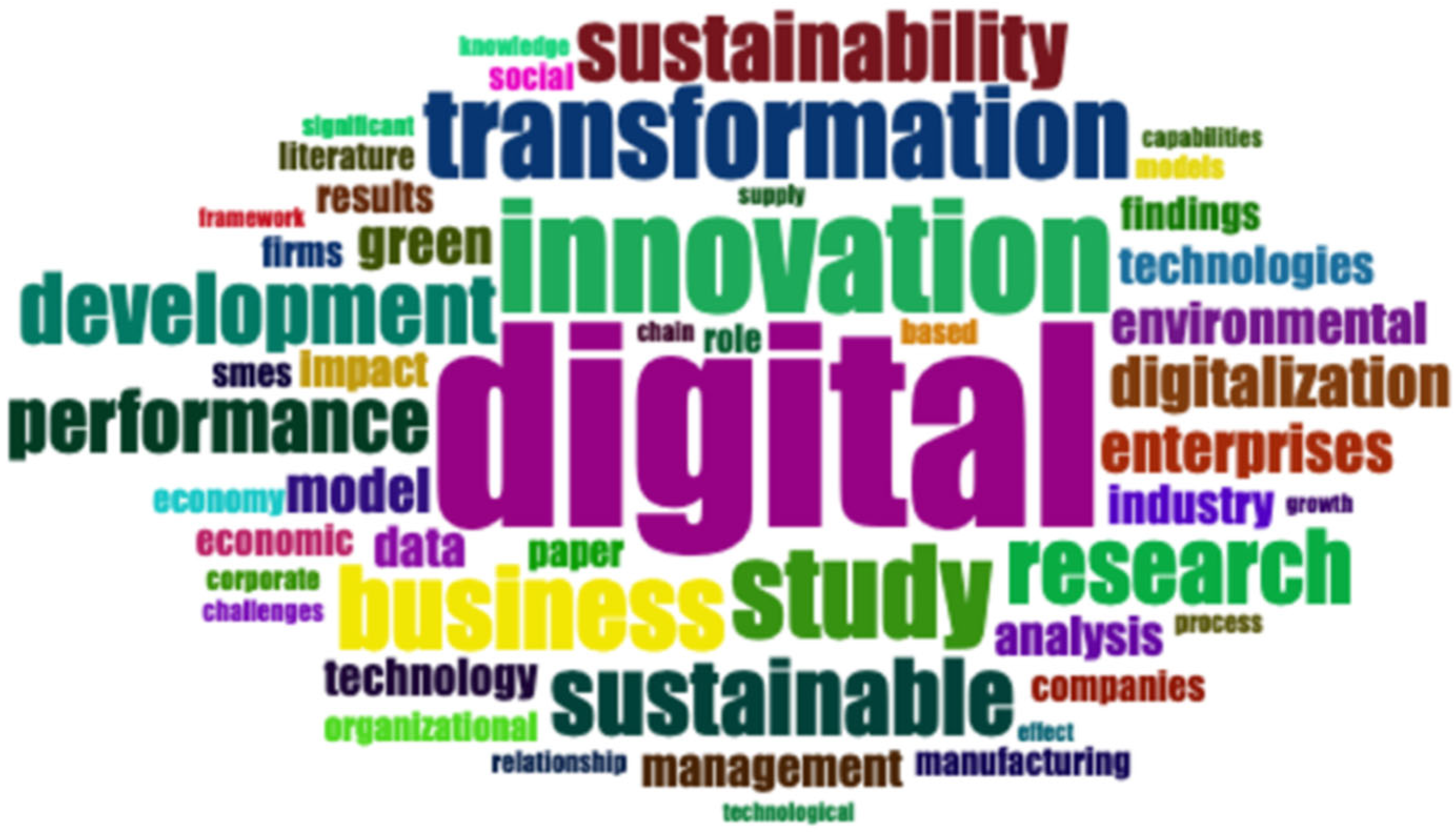
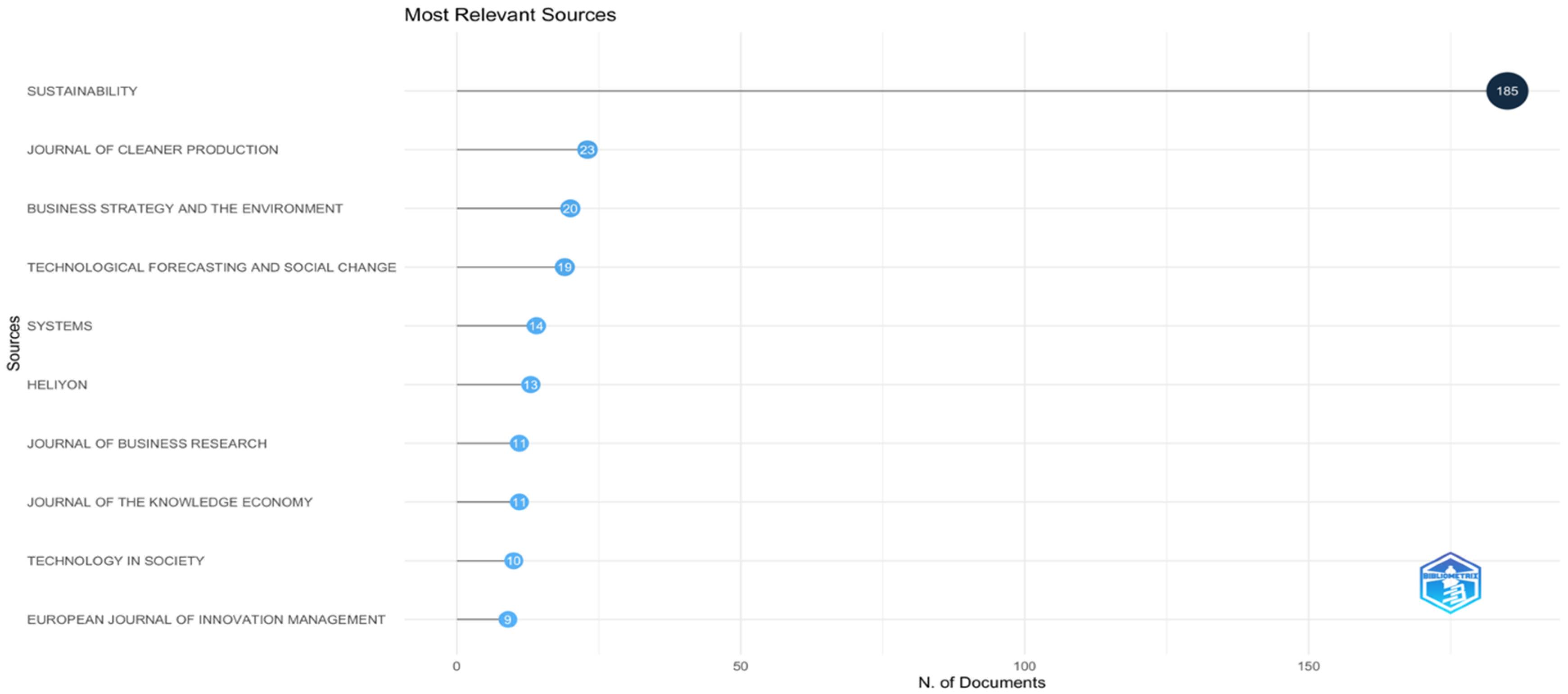
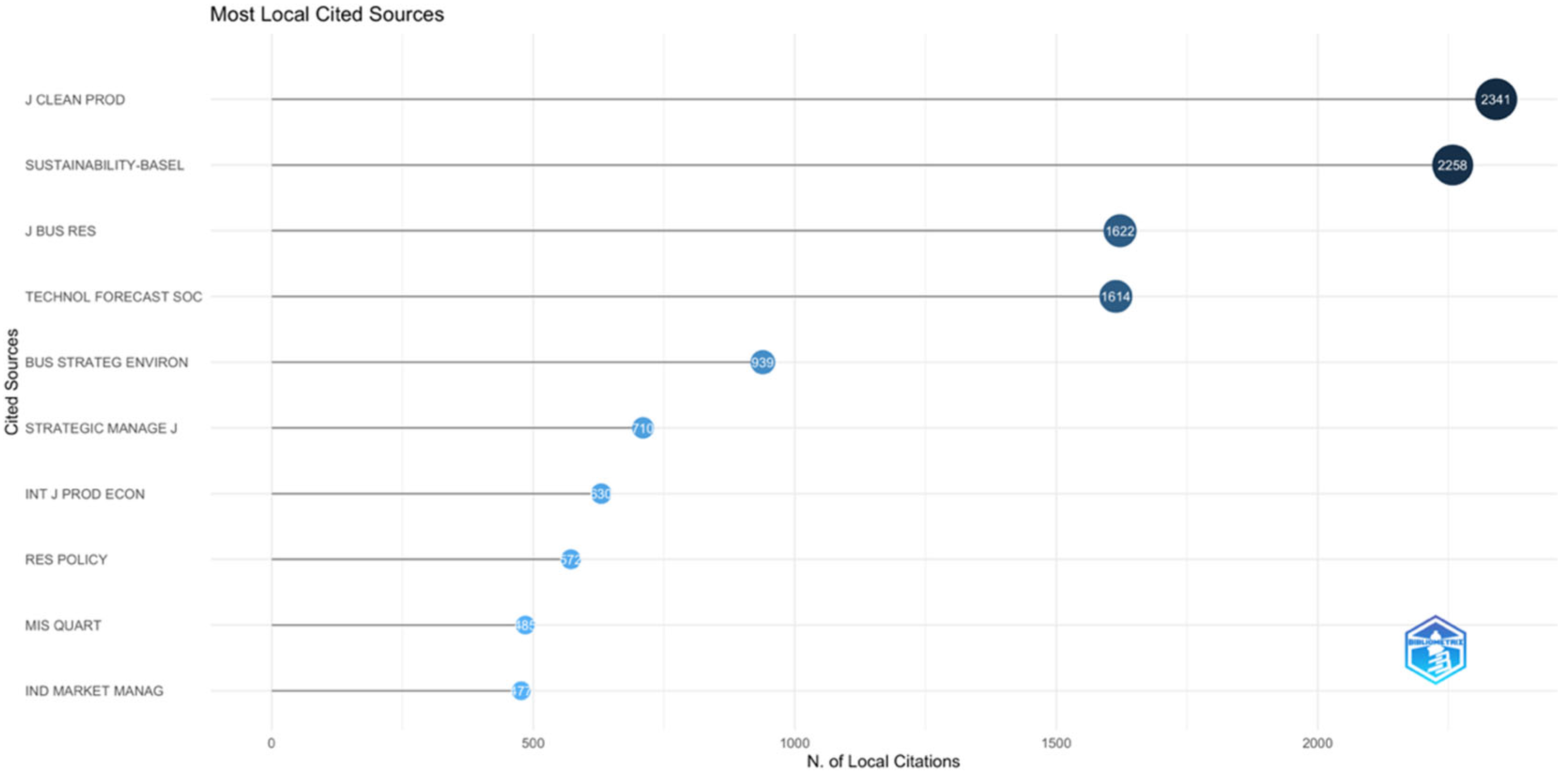
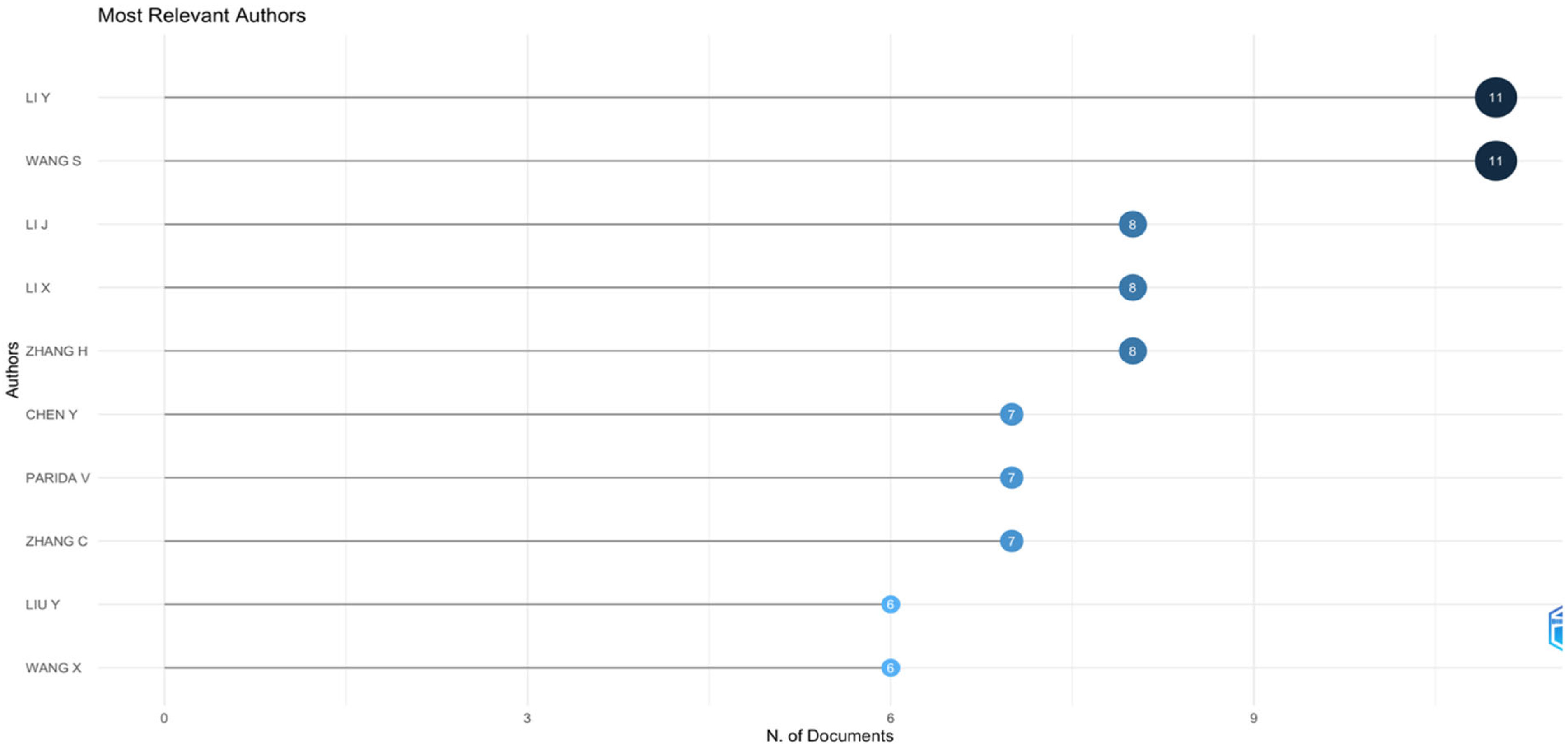
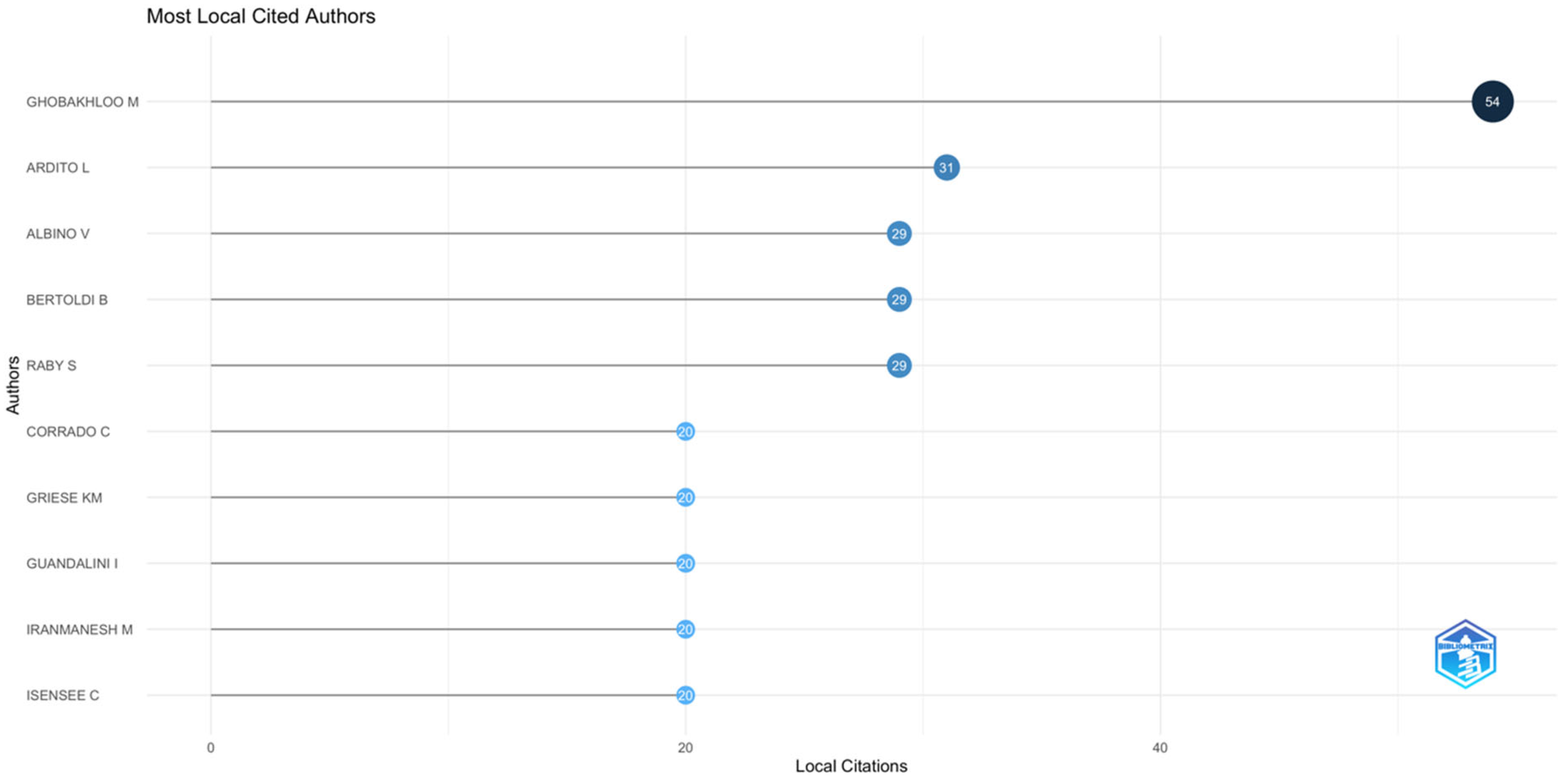
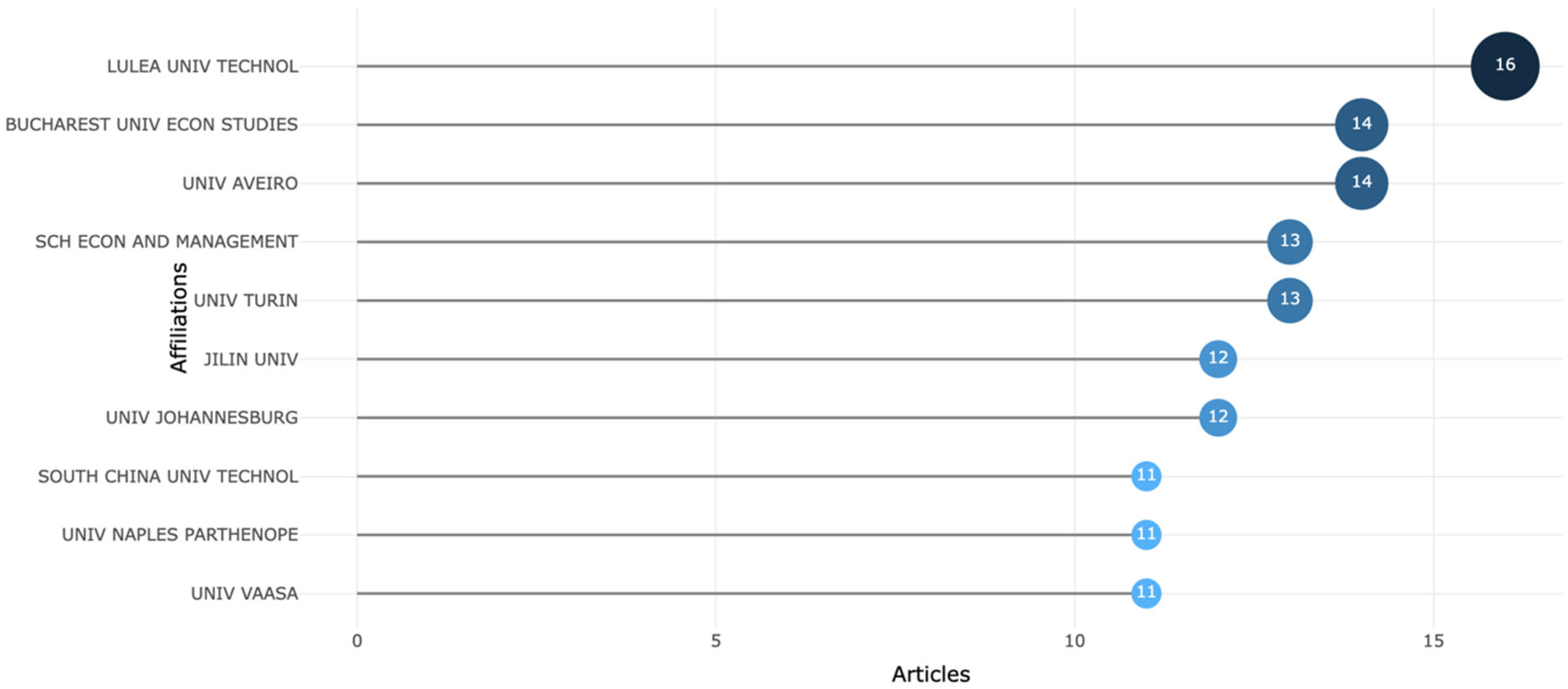
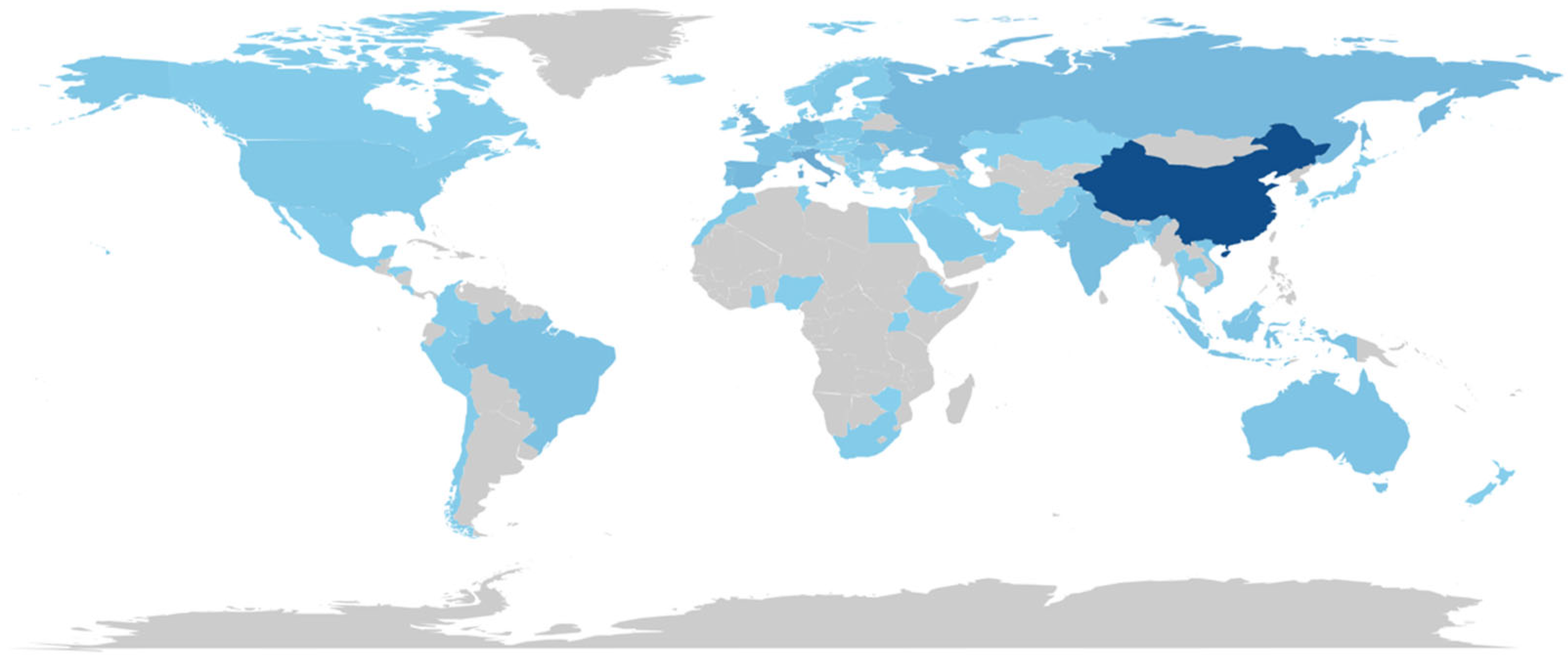
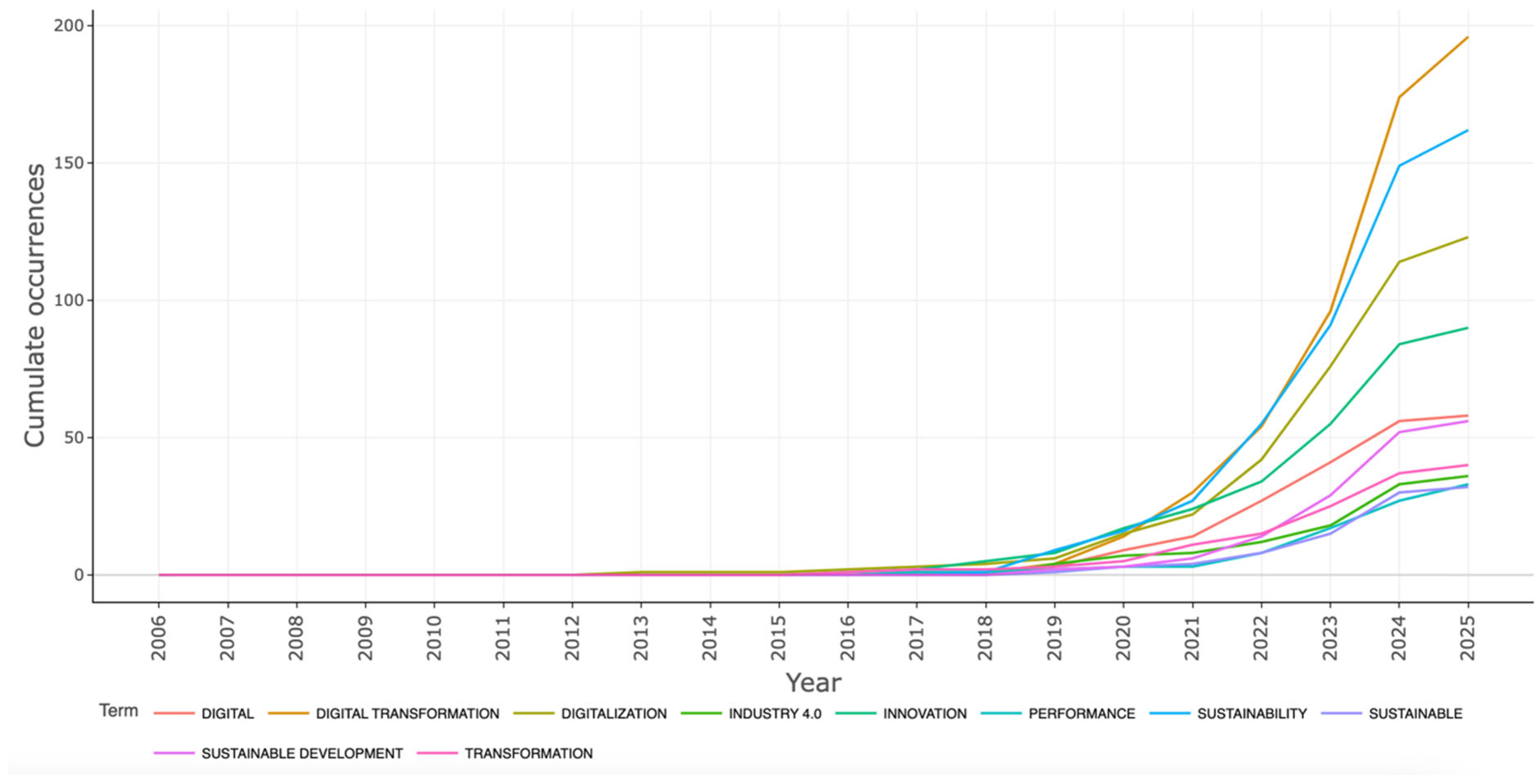
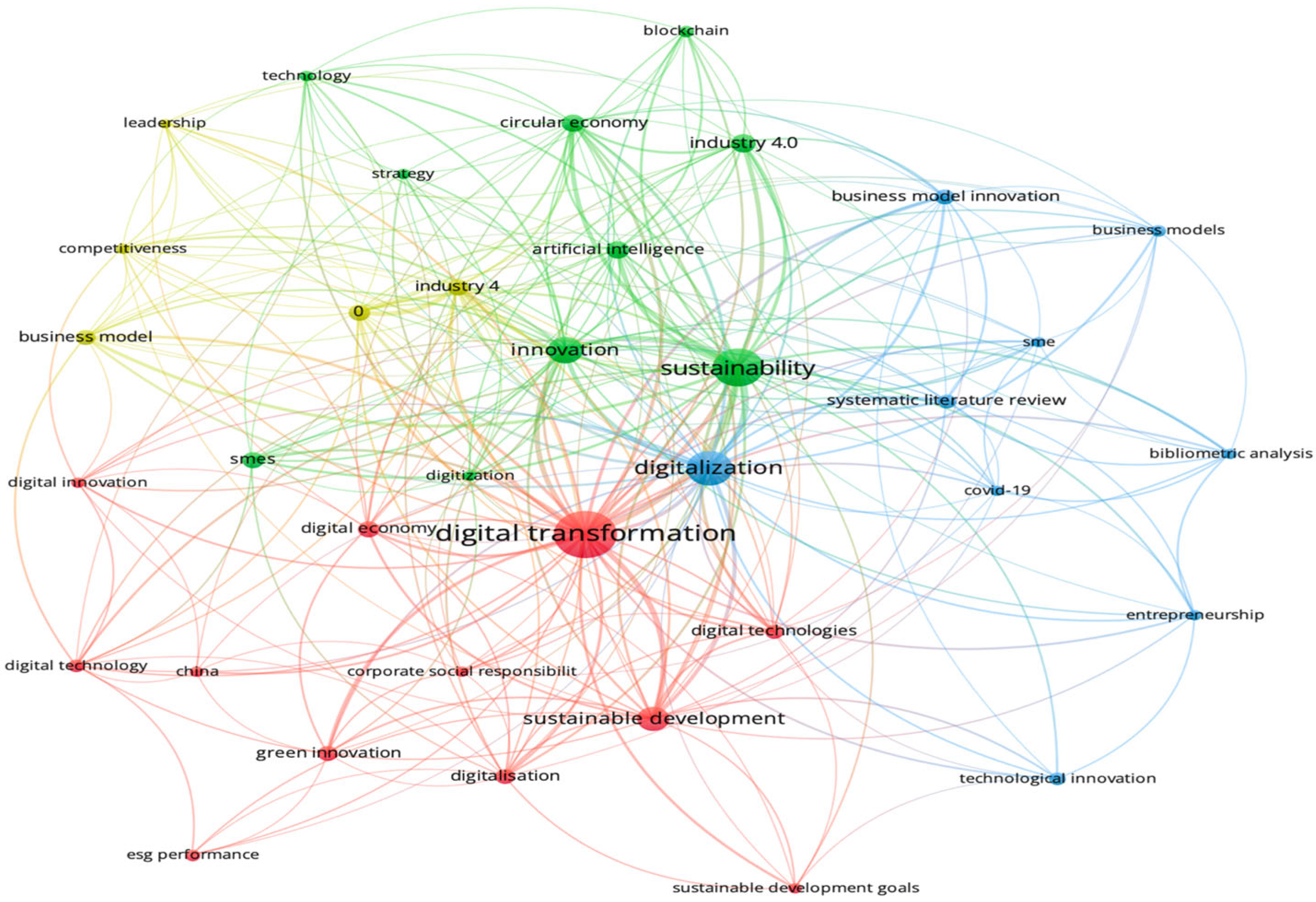
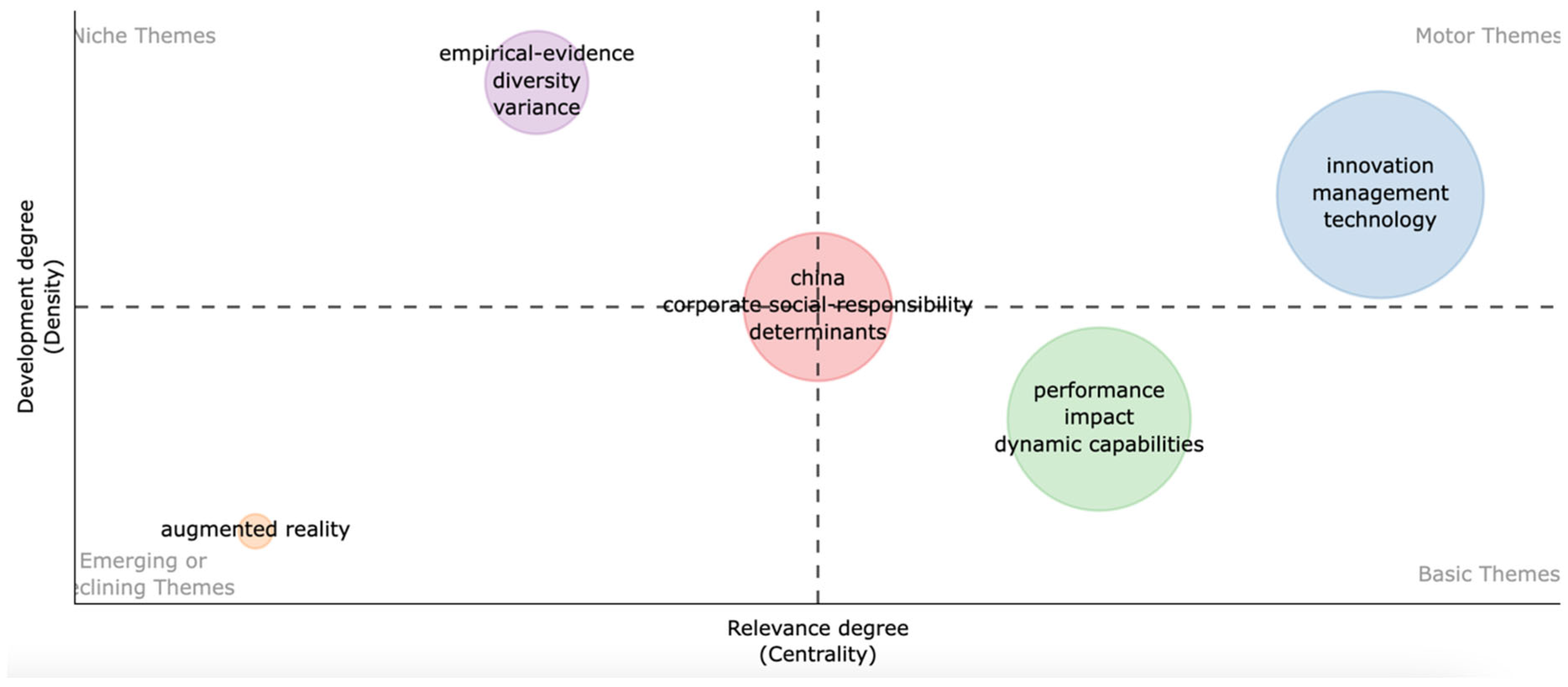
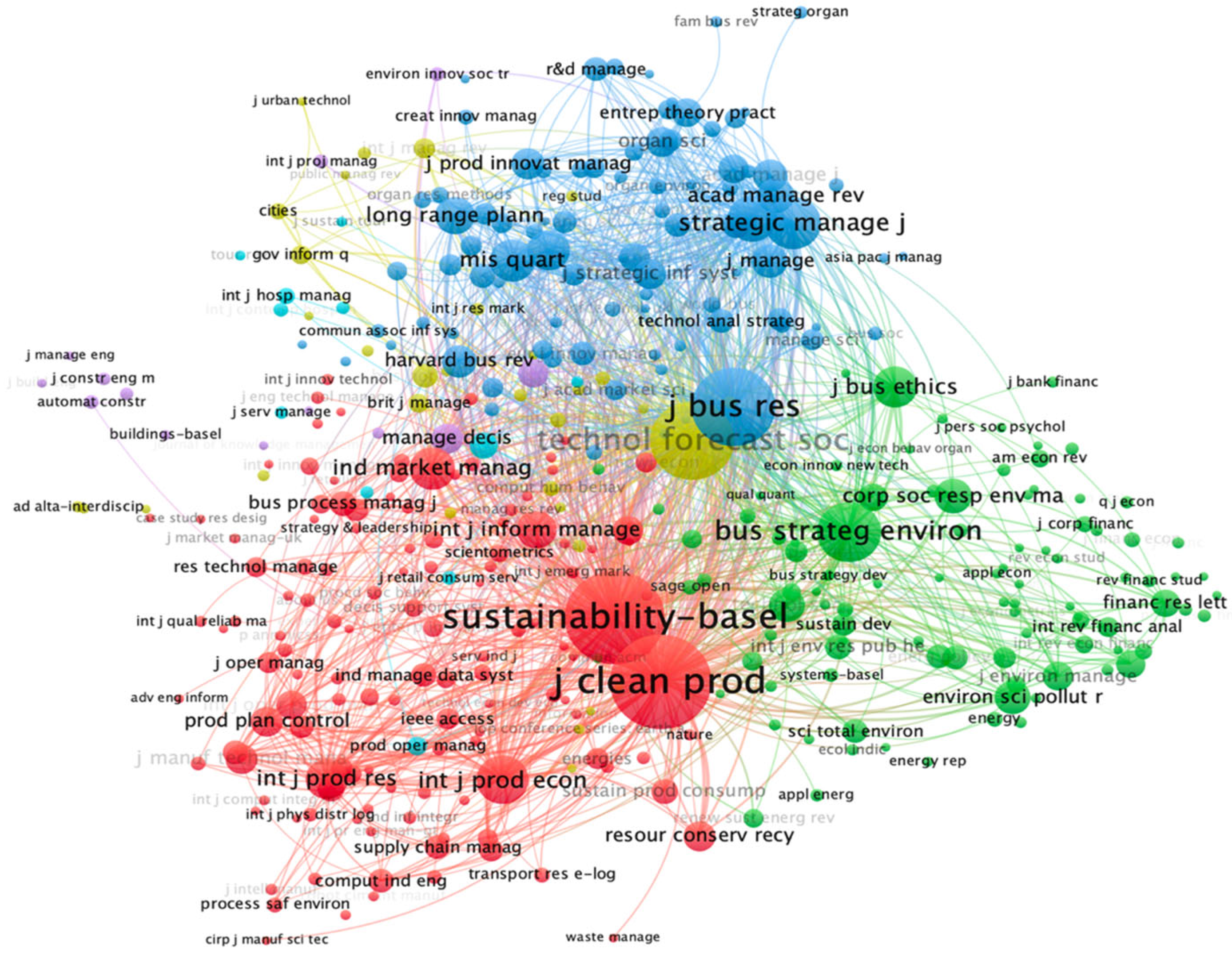
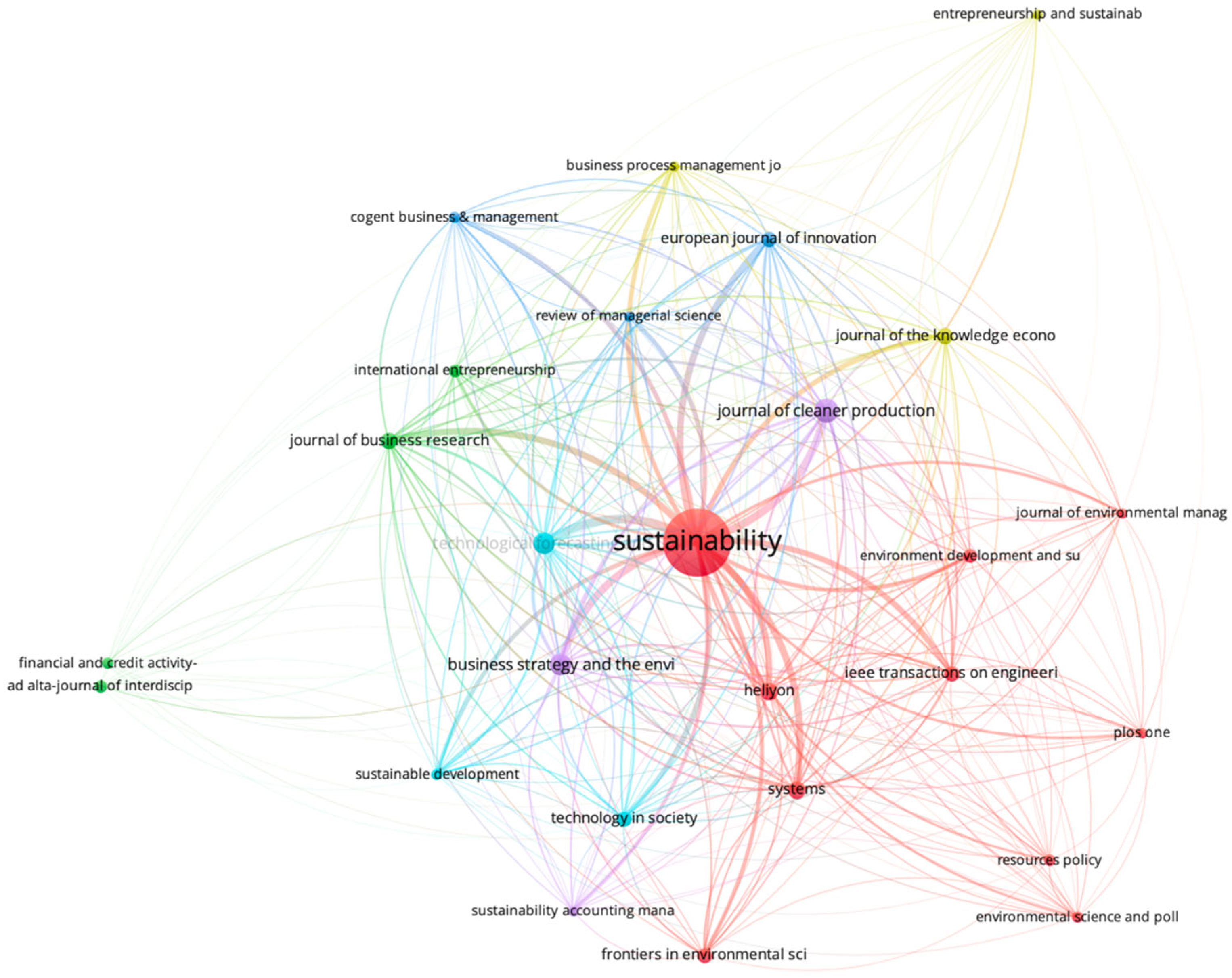
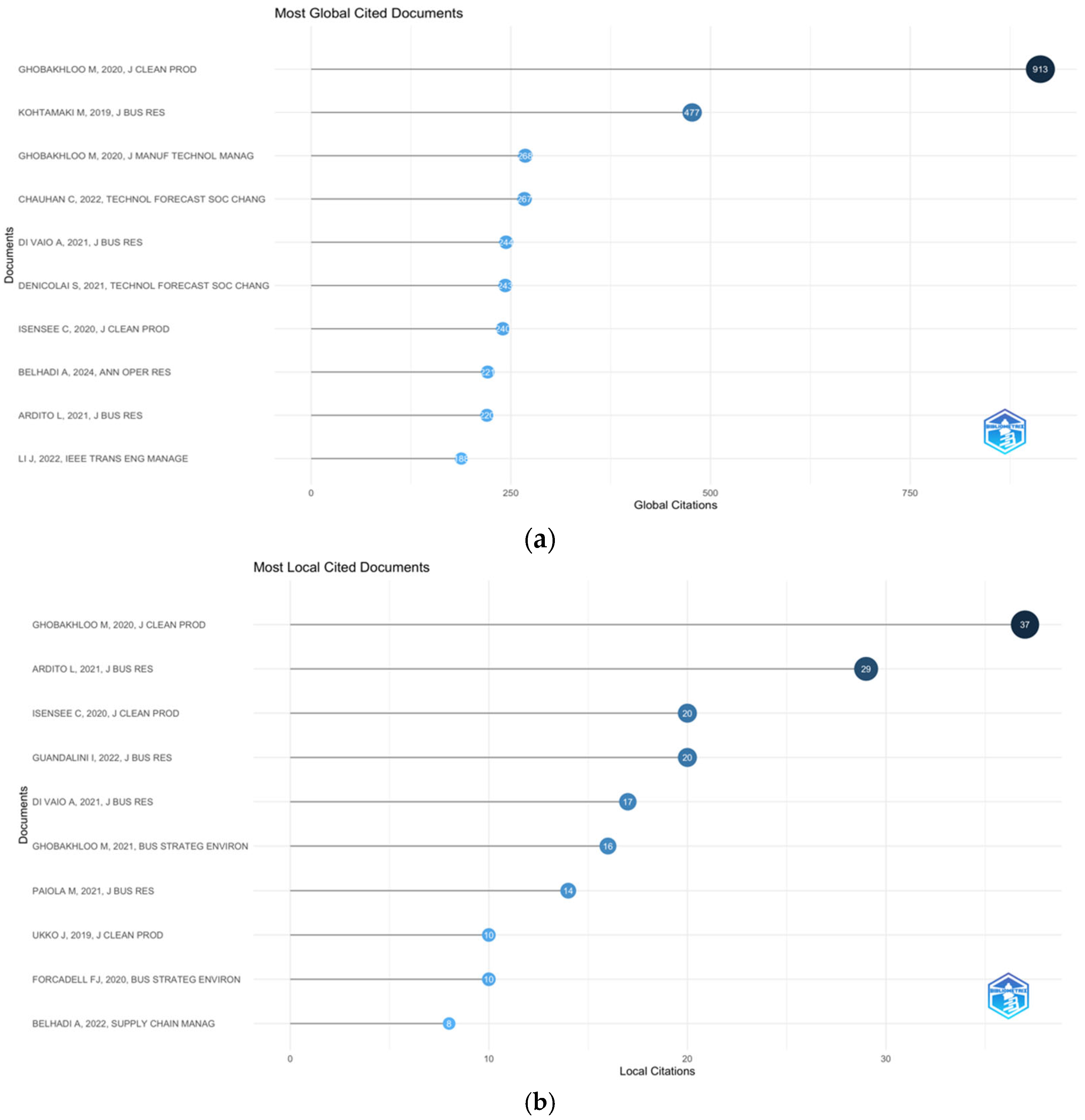
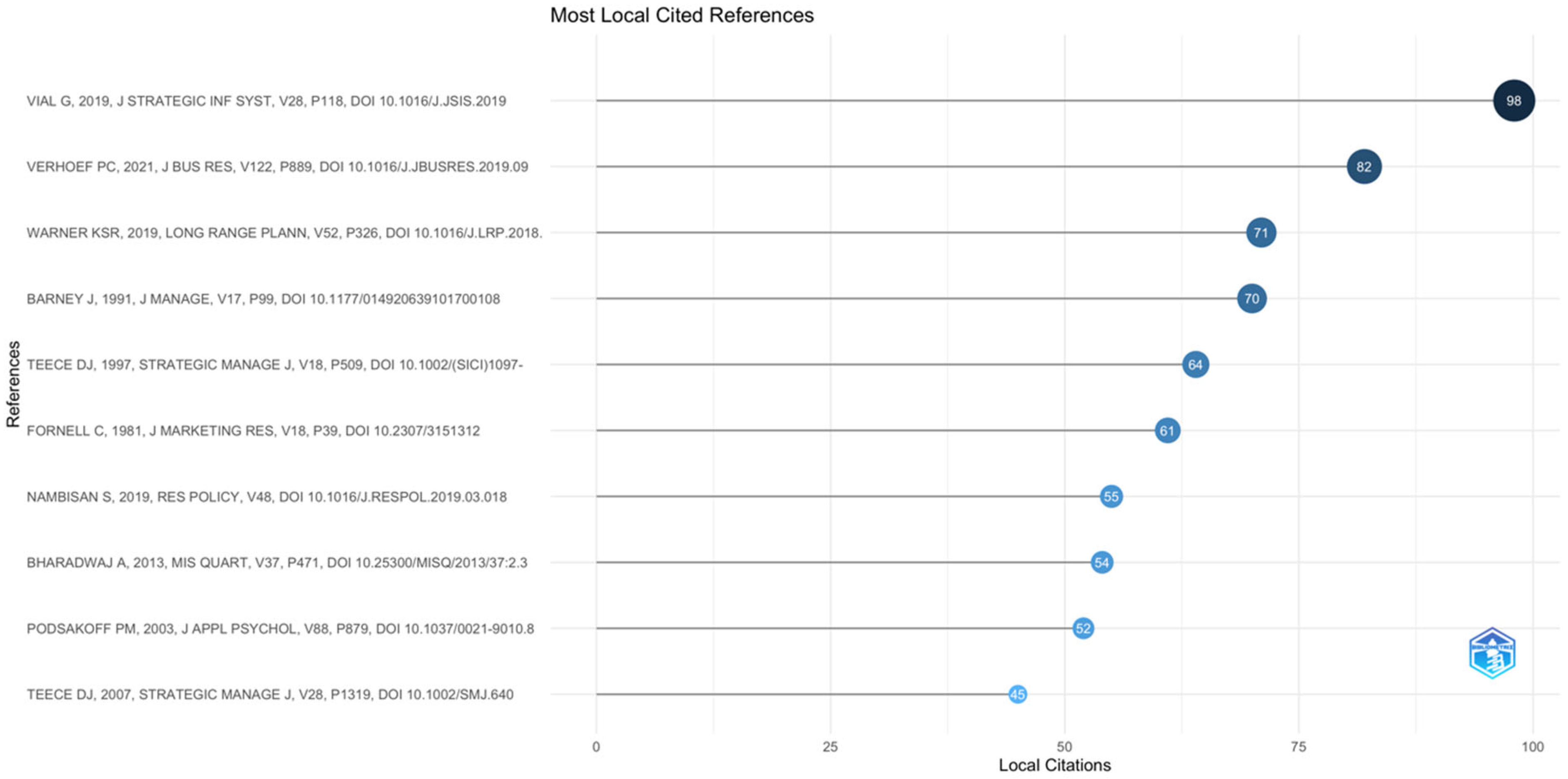
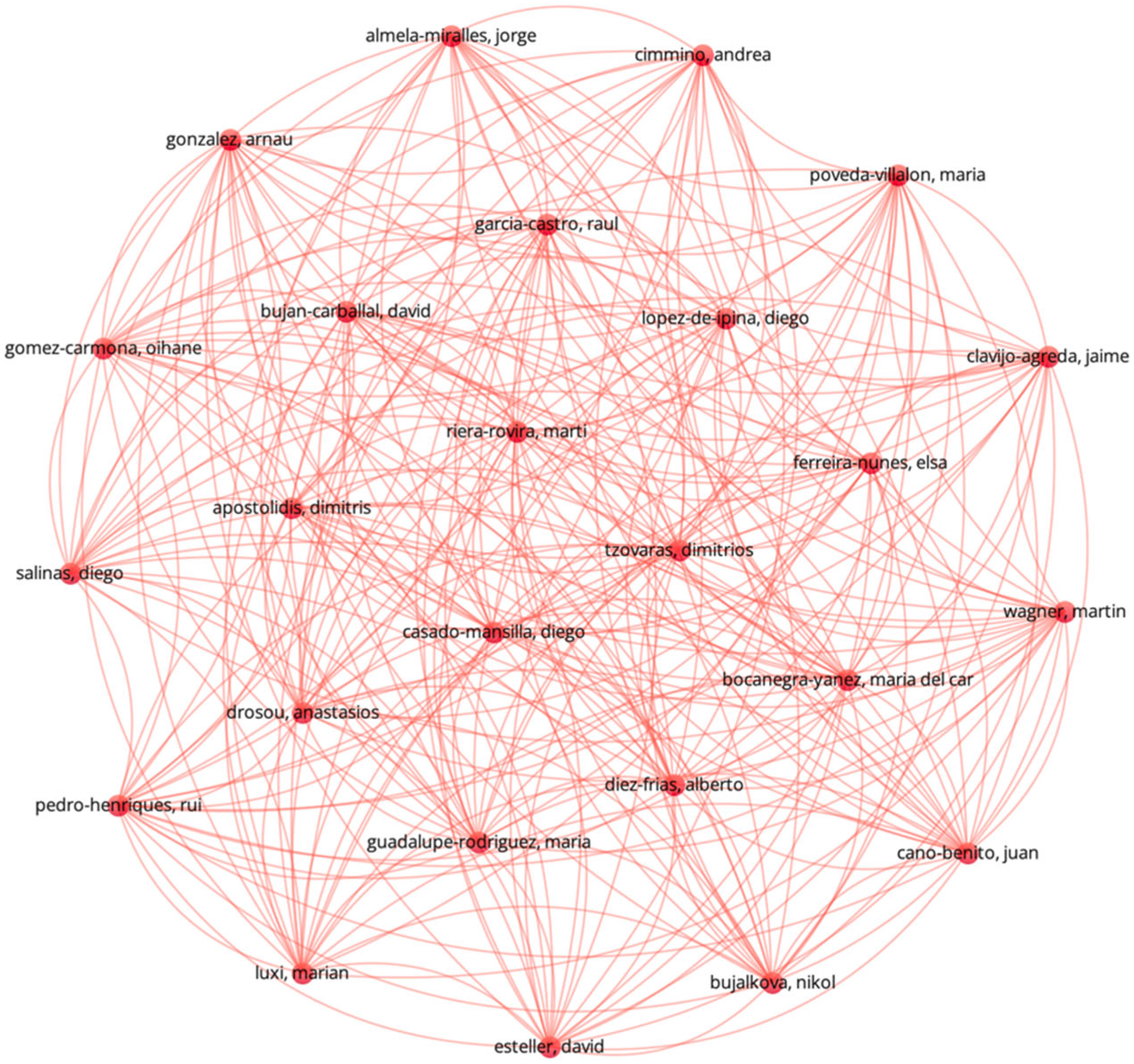
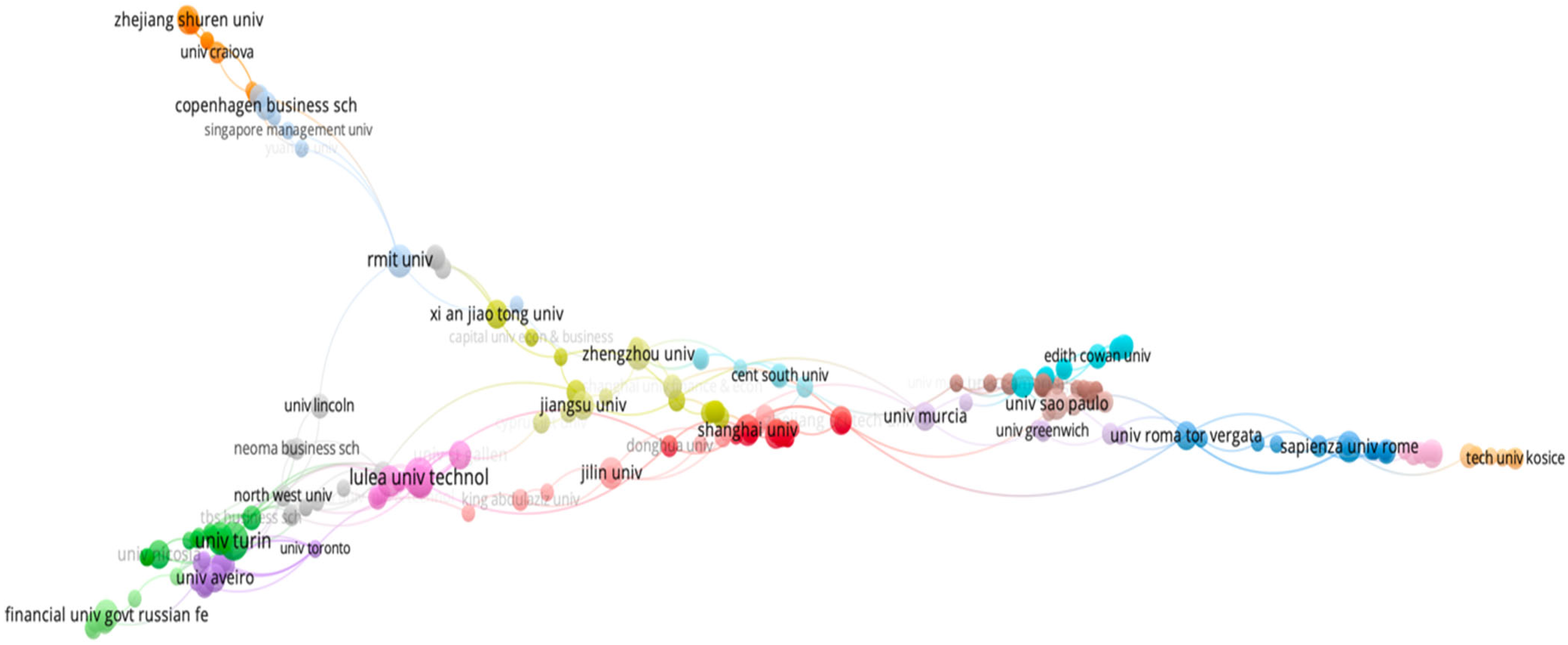
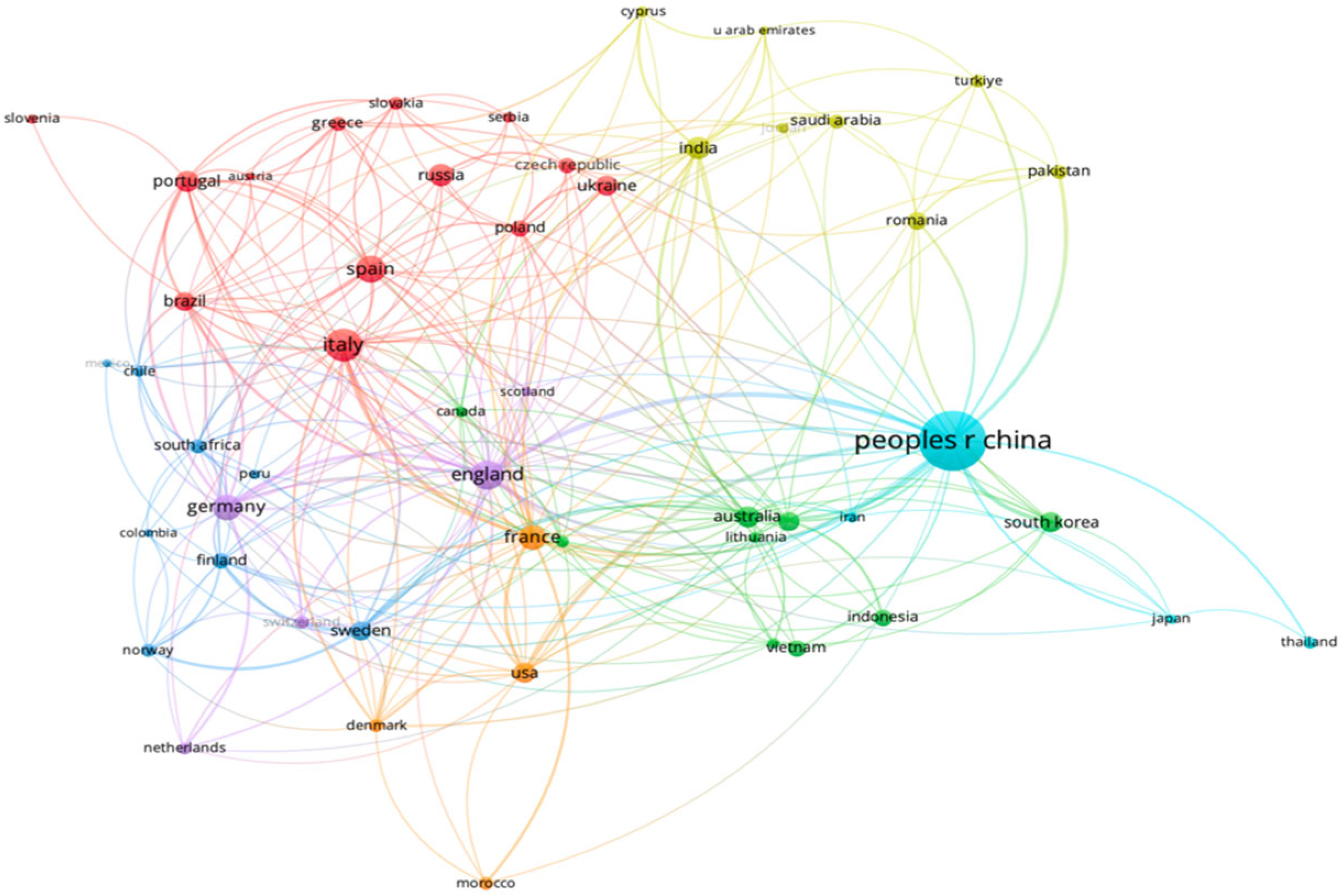
| Description | Results |
|---|---|
| MAIN INFORMATION ABOUT DATA | |
| Timespan | 2004:2025 |
| Sources | 290 |
| Documents | 775 |
| Annual Growth Rate % | 21.99 |
| Document average age | 2.21 |
| References | 46,343 |
| DOCUMENT CONTENTS | |
| Keywords Plus (ID) | 1088 |
| Author’s Keywords (DE) | 2493 |
| AUTHORS | |
| Authors | 2483 |
| Authors of single-authored docs | 58 |
| AUTHORS COLLABORATION | |
| Single-authored docs | 60 |
| Co-authors per doc | 3.68 |
| International co-authorships % | 34.71 |
| DOCUMENT TYPES | |
| Article | 579 |
| Article; early access | 75 |
| Proceedings paper | 64 |
| review | 56 |
| Review; early access | 1 |
| Year | Number of Articles Published | Total Citations | Number of Articles Published | Average Citations Per Article | Average Citations Per Citable Year | Citable Years |
|---|---|---|---|---|---|---|
| 2004 | 1 | 0 | 1 | 0.00 | 0.00 | 22 |
| 2006 | 1 | 0 | 1 | 0.00 | 0.00 | 20 |
| 2013 | 2 | 30 | 2 | 15.00 | 1.15 | 13 |
| 2016 | 2 | 1 | 2 | 0.50 | 0.05 | 10 |
| 2017 | 7 | 105 | 7 | 15.00 | 1.67 | 9 |
| 2018 | 11 | 275 | 11 | 25.00 | 3.12 | 8 |
| 2019 | 21 | 934 | 21 | 44.48 | 6.35 | 7 |
| 2020 | 39 | 2684 | 39 | 68.82 | 11.47 | 6 |
| 2021 | 55 | 2468 | 55 | 44.87 | 8.98 | 5 |
| 2022 | 103 | 2987 | 103 | 29.00 | 7.25 | 4 |
| 2023 | 179 | 2517 | 179 | 14.06 | 4.69 | 3 |
| 2024 | 289 | 1097 | 289 | 3.80 | 1.90 | 2 |
| 2025 | 65 | 38 | 65 | 0.58 | 0.60 | 1 |
| Country | Total Citations | Total Papers | Average Article Citations |
|---|---|---|---|
| Italy | 2179 | 57 | 38.20 |
| China | 2015 | 206 | 9.80 |
| Iran | 1185 | 4 | 296.20 |
| Germany | 825 | 30 | 27.50 |
| Finland | 665 | 7 | 95.00 |
| United Kingdom | 548 | 24 | 22.80 |
| Sweden | 471 | 15 | 31.40 |
| France | 438 | 17 | 25.80 |
| Spain | 424 | 32 | 13.20 |
| Portugal | 297 | 23 | 12.90 |
| Research Direction | Description |
|---|---|
| Exploring the causal mechanisms through which emerging technologies are driving sustainability-oriented innovation | The keyword co-occurrence network (Figure 11) highlights “blockchain”, “artificial intelligence”, and “Industry 4.0” as connected to sustainability, but their role in sustainable business models remains underdeveloped. Thus, future researchers should move beyond conceptual associations and examine how specific digital technologies (e.g., blockchain, AI, the IoT) influence sustainability outcomes through concrete innovation pathways (such as circular economy adoption, sustainable product design, or green supply chain management). At the same time, future researchers should explore the ethical and environmental implications of integrating digital technologies in corporate sustainability strategies, as well as conduct comparative case studies on organizations leveraging AI-driven decision-making and IoT solutions for enhancing sustainability performance. Mixed-method approaches are recommended, such as multiple case studies in key sectors (manufacturing, logistics, agri-food) or structural equation modeling (SEM) based on organizational survey data. |
| Measuring the performance impact of digital transformation on sustainability goals | The thematic mapping (Figure 12) identified “performance”, “impact”, and “dynamic capabilities” as basic themes, suggesting they are fundamental but still evolving. Thus, rather than treating digitalization as a binary variable, future research could quantify the level of digital maturity and link it to sustainability KPIs (such as carbon emissions, resource efficiency, waste reduction), as well as examine the long-term financial and environmental trade-offs of digital sustainability strategies in different industries and regions and use big data and machine learning to analyze how digital initiatives affect ESG performance. Studies can use survey-based digital capability indexes, matched with firm-level sustainability performance data, or econometric modeling across industries. |
| Strengthening the link between digitalization and corporate social responsibility (CSR) | The co-occurrence analysis (Figure 11) links “corporate social responsibility” (CSR) with “digital transformation” and “sustainable development”, yet CSR remains less central. There is a need to empirically assess how digital tools—such as data analytics, blockchain, and AI-based transparency platforms—contribute to CSR implementation and ESG accountability. Research should investigate how digital technologies (e.g., big data analytics, AI-powered transparency tools) can enhance CSR and ESG reporting, examine the role of digital platforms in enabling stakeholder engagement and ethical decision-making in sustainable business practices, and explore how companies can use blockchain for transparent supply chain management, reducing fraud and improving corporate accountability. Suggested methods include longitudinal studies on CSR reporting evolution pre-/post-digitalization, panel data analysis using ESG performance indices, or sentiment/content analysis of CSR disclosures. |
| Investigating barriers and enablers of digital sustainability strategies among SMEs and entrepreneurs | The blue cluster in Figure 12 links “entrepreneurship” and “SMEs” with sustainability and digitalization, but this relationship is less explored compared to larger corporations. Thus, future scholars should focus on identifying context-specific challenges (financial constraints, digital skill gaps) and enabling factors (policy incentives, digital ecosystems) that affect SMEs’ ability to implement digitally driven sustainable innovations. Recommended methods include qualitative interviews with entrepreneurs, regional comparative studies, or scenario-based design workshops. |
Disclaimer/Publisher’s Note: The statements, opinions and data contained in all publications are solely those of the individual author(s) and contributor(s) and not of MDPI and/or the editor(s). MDPI and/or the editor(s) disclaim responsibility for any injury to people or property resulting from any ideas, methods, instructions or products referred to in the content. |
© 2025 by the authors. Licensee MDPI, Basel, Switzerland. This article is an open access article distributed under the terms and conditions of the Creative Commons Attribution (CC BY) license (https://creativecommons.org/licenses/by/4.0/).
Share and Cite
Mihai, L.-S.; Sitnikov, V.V.; Sichigea, M.; Vasilescu, L.; Băndoi, A.; Sitnikov, C.; Mănescu, L.-G. A Bibliometric Analysis of the Role of Digitalization in Achieving Sustainability-Oriented Innovation. Sustainability 2025, 17, 5822. https://doi.org/10.3390/su17135822
Mihai L-S, Sitnikov VV, Sichigea M, Vasilescu L, Băndoi A, Sitnikov C, Mănescu L-G. A Bibliometric Analysis of the Role of Digitalization in Achieving Sustainability-Oriented Innovation. Sustainability. 2025; 17(13):5822. https://doi.org/10.3390/su17135822
Chicago/Turabian StyleMihai, Laurențiu-Stelian, Valeri Viorel Sitnikov, Mirela Sichigea, Laura Vasilescu, Anca Băndoi, Cătălina Sitnikov, and Leonardo-Geo Mănescu. 2025. "A Bibliometric Analysis of the Role of Digitalization in Achieving Sustainability-Oriented Innovation" Sustainability 17, no. 13: 5822. https://doi.org/10.3390/su17135822
APA StyleMihai, L.-S., Sitnikov, V. V., Sichigea, M., Vasilescu, L., Băndoi, A., Sitnikov, C., & Mănescu, L.-G. (2025). A Bibliometric Analysis of the Role of Digitalization in Achieving Sustainability-Oriented Innovation. Sustainability, 17(13), 5822. https://doi.org/10.3390/su17135822









